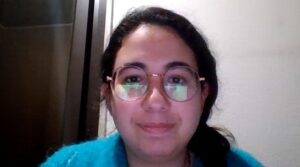A Unique, Eye-opening experience: A physician’s perspective by Rola Itani, MD

Being granted a scholarship to participate in the Bioethics Education International Spring School 2024 was not just a
unique and invaluable opportunity, but a testament to the belief and support of the scholarship committee. As a first-time attendee, I am deeply grateful for the chance to delve into the world of bioethics and AI ethics in such a unique virtual setting.
More so, the Bioethics Education International Spring School 2024 was a testament to the power of diversity and shared interests. The range of participants, from high school students to seasoned professionals, created a vibrant learning environment and sparked insightful discussions.
Let me highlight some of the key topics covered in this course. I found the discussions on various subjects quite intriguing. One area that caught my attention was artificial intelligence (AI) and bioethics. While I was aware of the advancements in AI, I was particularly amazed by the potential future developments discussed during certain lectures. Dr. Perihan Elif Ekmekci, a professor from Turkey, delivered a lecture shedding light on artificial intelligence. On the third day of school, Eve Herold presented an engaging talk about humanoid robots. Like everything else, there are both positive and negative aspects. The benefits of humanoid robots are evident in their assistance to older adults and people with disabilities who require constant support. However, when things go wrong, who is held responsible? Is the robot accountable? Is it the fault of the manufacturer or the designer? Does the robot possess consciousness like humans? The drawbacks also encompass the potential reinforcement of our narcissism, as the robot mirrors our behavior. Will this lead to a further boost in our egos?
Our sessions on COVID and the lessons learned during the pandemic years were exceptionally enlightening. Dr. Bryn Williams Jones led a thought-provoking discussion on bioethics in public spaces and its application to the COVID-19 pandemic, empowering us as bioethics enthusiasts in our public education role. Dr. John Loike provided a comprehensive overview of COVID-19, delving into the pathophysiology of the disease and the current treatment regimens. Dr. Jacob Appel offered valuable insights into the public health perspective of COVID in his session “Risk
& Resource Allocation in Times of Crisis: Lessons from the Recent Pandemic.”
We were privileged to witness the intersection of the arts and sciences in Dr Frederick Licciardi’s session, “Scientific Foundations for the Ethical Discussion of Fertility Treatments.” As a professor of Obstetrics and Gynecology, a fertility expert, and an accomplished musician and scientist, Dr. Licciardi eloquently demonstrated the symbiotic relationship between the arts and sciences.
Dr. Francis P. Crawley delivered an engaging lecture entitled “Frontline Bioethics: War, Disease, Politics and the Impact on Humanity.” Dr Joyce M. Tsoka-Gwegweni, PhD, shed light on universal health coverage in Africa, while Dr Jonathan D. Moreno provided valuable insights in his lecture “Absolutely Essential: Bioethics and the Rules-Based International Order.”
Dr. Jeanne F. Loring’s lecture, “Preserving Integrity in Science,” addressed critical aspects of research and integrity in science, including the challenges we encounter in our professional research journey.
On the last day of school, Adarsh Srivastava gave a session on “AI Ethics: Why it Matters!” He used his expertise to highlight the importance of AI ethics and showed an AI version of himself. He discussed ethical concerns with AI, including bias and the spread of inaccurate information by AIs like ChatGPT.
The course ended with a group presentation on two topics: AI ethics and patient-physician interaction and the role of humanity. The participants were divided into two groups based on interest, and both groups discussed the topics and presented thoughtful PowerPoint presentations. I wish to extend my gratitude to all our speakers for generously sharing their expertise and a special thanks to Dr. Michael R. Berman for sharing his poignant poems and experiences in dealing with death, particularly in patients for whom we cannot provide a cure.
The whole course proved to be in line with Bioethics Education International’s (BEI) mission. BEI is a not-for-profit international organisation aiming to advance policy and intercultural bioethics debates from the beginning to the end of life. Through online engaging and interactive sessions, pertinent topics were discussed and incorporated into an interdisciplinary and intercultural approach. The course included diverse international participants and speakers, enriching the debates and discussions and providing networking opportunities.
Many thanks to Dr Ana Lita for her dedication to the BEI mission and for putting on a successful, inspiring school and keeping bioethics alive. I appreciate her interns, Saniyya Butler, Pushpa Jadhav and Aiden Wang, through whose help the event went smoothly! Thank you to all the participants who engaged in fruitful discussions and provided insightful international perspectives.
Rola Itani, MD
Family Medicine Resident
American University of Beirut
Lebanon
